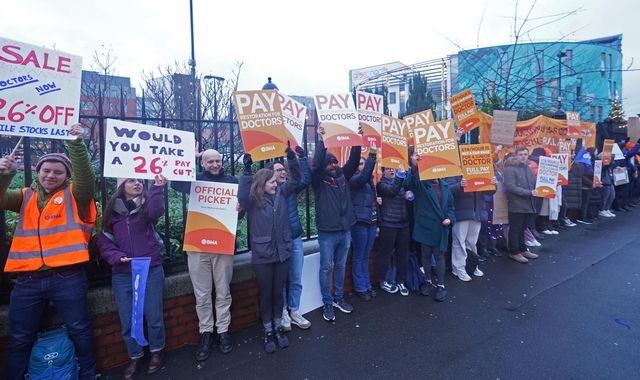The salary increases, announced by ministers on Thursday afternoon, are 2.8% above what the government had originally budgeted for.
The 4% rise is above the current rate of inflation, which increased from 2.6% in March to 3.5% in April.
It will apply to all doctors and teachers in England and Wales.
But both the British Medical Association (BMA) and National Education Union (NEU) have threatened further strike action following the government’s announcement, claiming the increases do not account for historical pay freezes.
Other NHS workers in England, including nurses, midwives, and physiotherapists, will get a 3.6% pay increase effective from 1 April, Health Secretary Wes Streeting said.
He added that junior doctors would be offered an average increase of 5.4% as a result of a further £750 top-up.
Senior civil servants will get a 3.25% pay increase, the Cabinet Office added, but there are still changes to be made to higher salary bands within the civil service.
Prison officers and managers will get the same 4% pay rise as doctors and teachers, Justice Secretary Shabana Mahmood said.
Military personnel are being offered a 4.5% rise following their own independent pay review. Senior military officers will get a slightly lower increase of 3.75%, with Defence Secretary John Healey saying the changes “recognises their dedication to keep Britain secure at home and strong abroad”.
Unions say offers are ‘woefully inadequate’
The government’s proposals on pay have been met with anger among healthcare unions, with the BMA describing its offer for doctors as “woefully inadequate”.
Professor Philip Banfield, chairman of the BMA council, said doctors are already considering striking again.
“Doctors’ pay is still around a quarter less than it was in real terms 16 years ago and today’s ‘award’ delays pay restoration even more, without a Government plan or reassurance to correct this erosion of what a doctor is worth,” he said.
Other NHS workers who belong to either the Royal College of Nursing (RCN) or GMB unions are being asked to vote on whether they will accept their offers or not.
RCN general secretary and chief executive Professor Nicola Ranger warned pay increases have already been “entirely swallowed up by inflation and do nothing to change the status quo – where nursing is not valued, too few enter it and too many quit”.
While education unions have been less resistant, the NEU, which is the largest teacher union, threatened to “register a dispute” with the government if it does not fund all of the pay rises itself – as they are currently being offered as part of existing school budgets, which they insist is needed for pressing matters outside staffing.





























